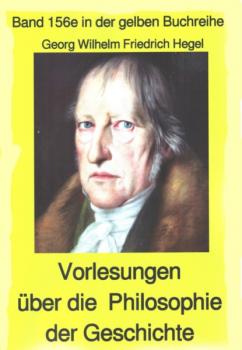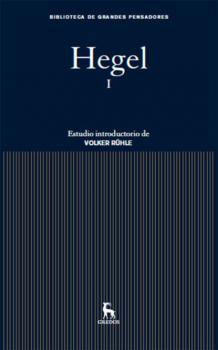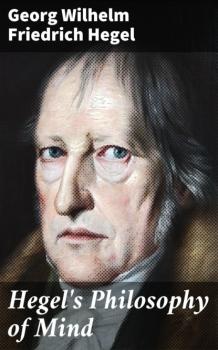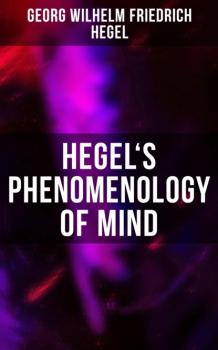ТОП просматриваемых книг сайта:















Georg Wilhelm Friedrich Hegel
Список книг автора Georg Wilhelm Friedrich HegelGeorg Wilhelm Friedrich Hegel: Philosophie der Geschichte - Georg Wilhelm Friedrich Hegel
gelbe BuchreiheАннотация
Georg Wilhelm Friedrich Hegels Vorlesungen über die Philosophie der Geschichte betrachten die ganze Menschheit von den alten Chinesen, über die asiatischen Religionsformen des Buddhismus und die indische Religionspraxis, über die griechische Antike, das römische Reich, die germanische Völkerwanderung, die islamischen Sarazenen, Karl, den Großen, das Mittelalter, die Renaissance, die Reformation bis in die Neuzeit. Hegel meint, «dass die Philosophie der Geschichte nichts anderes als die denkende Betrachtung derselben bedeutet». – Rezession: Ich bin immer wieder begeistert von der «Gelben Buchreihe». Die Bände reißen einen einfach mit. Inzwischen habe ich ca. 20 Bände erworben und freue mich immer wieder, wenn ein neues Buch erscheint. oder: Sämtliche von Jürgen Ruszkowski aus Hamburg herausgegebene Bücher sind absolute Highlights. Dieser Band macht da keine Ausnahme. Sehr interessante und abwechslungsreiche Themen aus verschiedenen Zeit-Epochen, die mich von der ersten bis zur letzten Seite gefesselt haben! Man kann nur staunen, was der Mann in seinem Ruhestand schon veröffentlicht hat. Alle Achtung!
Информация о книге
Автор произведения Georg Wilhelm Friedrich Hegel
Жанр Документальная литература
Серия gelbe Buchreihe
Аннотация
Este segundo volumen contiene dos títulos imprescindibles: Líneas fundamentales de la filosofía del derecho y Lecciones de la filosofía de la historia. La obra de Hegel (Stuttgart, 1770 – Berlín, 1831) constituye un hito singular en el pensamiento occidental, puesto que aporta un novedoso enfoque sobre el devenir de las civilizaciones, las sociedades y sus producciones culturales. Autor del último gran sistema filosófico omniabarcador, Hegel presenta su idealismo como un medio capaz no sólo de dar cuenta racional de los acontecimientos pasados, sino de determinar qué es relevante y sustancial y qué no lo es en la infinita serie de los hechos. Porque concibe la realidad como un organismo de contrarios dialécticos, y como manifestación y desarrollo del «Espíritu absoluto», que alcanza su maduración y autoconocimiento a través de la historia y la cultura humanas. Este segundo volumen dedicado a Hegel contiene dos tratados capitales: Líneas fundamentales de la filosofía del derecho, en la que Hegel pretende fundamentar la rama jurídica del saber como una ciencia estrechamente ligada al curso general de la historia y su armazón lógica, y Lecciones de la filosofía de la historia, interpretación racional del proceso de las civilizaciones, a la luz de la paulatina manifestación del espíritu y de un plan total que abarca y justifica todo, incluso el mal y la desdicha, así como el individuo, que queda subsumido en el Estado. Estudio introductorio de Volker Rühle (1955), profesor extraordinario de la Universidad de Hildesheim (Alemania) y profesor honorario de la Universidad Autónoma de Madrid. Ha trabajado además como profesor invitado en la Universidad de los Andes (Bogotá), la UNED (Madrid) y en la Universidad Karlova de Praga. Sus libros y artículos en alemán y castellano versan sobre problemas de la filosofía clásica alemana, su génesis y sus ramificaciones hasta el presente.
Аннотация
Hegel ha tenido una enorme influencia en el mundo moderno –de él bebieron Marx y todos los marxismos– y ha modelado la historiografía: cualquier relato que postule un sentido general en la historia es hegeliano. La obra de Hegel (Stuttgart, 1770 – Berlín, 1831) constituye un hito singular en el pensamiento occidental, puesto que aporta un novedoso enfoque sobre el devenir de las civilizaciones, las sociedades y sus producciones culturales. Autor del último gran sistema filosófico omniabarcador, Hegel presenta su idealismo como un medio capaz no sólo de dar cuenta racional de los acontecimientos pasados, sino de determinar qué es relevante y sustancial y qué no lo es en la infinita serie de los hechos. Porque concibe la realidad como un organismo de contrarios dialécticos, y como manifestación y desarrollo del «Espíritu absoluto», que alcanza su maduración y autoconocimiento a través de la historia y la cultura humanas. Este volumen contiene dos obras fundamentales en el sistema hegeliano: Diferencia entre los sistemas de Fichte y Schelling (análisis de las doctrinas de dos contemporáneos y pensadores afines en la línea del idealismo postkantiano) y Fenomenología del espíritu, que expone los conceptos hegelianos esenciales acerca de la objetivación del espíritu absoluto en la historia universal y, por tanto, la estructura lógica y racional de ésta. Estudio introductorio de Volker Rühle (1955), profesor extraordinario de la Universidad de Hildesheim (Alemania) y profesor honorario de la Universidad Autónoma de Madrid. Ha trabajado además como profesor invitado en la Universidad de los Andes (Bogotá), la UNED (Madrid) y en la Universidad Karlova de Praga. Sus libros y artículos en alemán y castellano versan sobre problemas de la filosofía clásica alemana, su génesis y sus ramificaciones hasta el presente.
Аннотация
Science of Logic is the work in which Georg Wilhelm Friedrich Hegel outlined his vision of logic. For Hegel, the most important achievement of German idealism, starting with Immanuel Kant and culminating in his own philosophy, was the argument that reality is shaped through and through by thought and is, in a strong sense, identical to thought. Thus ultimately the structures of thought and being, subject and object, are identical. Since for Hegel the underlying structure of all of reality is ultimately rational, logic is not merely about reasoning or argument but rather is also the rational, structural core of all of reality and every dimension of it. Thus Hegel's Science of Logic includes among other things analyses of being, nothingness, becoming, existence, reality, essence, reflection, concept, and method. As developed, it included the fullest description of his dialectic.
Аннотация
The Philosophy of Fine Art is regarded by many as one of the greatest aesthetic theories to have been produced since Aristotle. Hegel's thesis about the historical dissolution of art has been the subject of much scholarly debate. Hegel develops his account of art as a mode of absolute spirit that he calls «the beautiful ideal.»
Аннотация
"Hegel's Philosophy of Mind" by Georg Wilhelm Friedrich Hegel (translated by William Wallace). Published by Good Press. Good Press publishes a wide range of titles that encompasses every genre. From well-known classics & literary fiction and non-fiction to forgotten−or yet undiscovered gems−of world literature, we issue the books that need to be read. Each Good Press edition has been meticulously edited and formatted to boost readability for all e-readers and devices. Our goal is to produce eBooks that are user-friendly and accessible to everyone in a high-quality digital format.
Аннотация
The Phenomenology of Mind is Hegel's most widely discussed philosophical work. Hegel described the work as an «exposition of the coming to be of knowledge». This is explicated through a necessary self-origination and dissolution of «the various shapes of spirit as stations on the way through which spirit becomes pure knowledge». Focusing on topics in metaphysics, epistemology, physics, ethics, history, religion, perception, consciousness, and political philosophy, it is where Hegel develops his concepts of dialectic (including the master–slave dialectic), absolute idealism, ethical life, and Aufhebung. It had a profound effect in Western philosophy.
Аннотация
Philosophy of Mind is a work that presents an abbreviated version of Hegel's systematic philosophy in its entirety. In Philosophy of Mind Hegel pays more attention to the concept of freedom. Much of the work deals with the psychology of freedom, if one can use the phrase without it being an anachronism. Also, he goes into more detail in the political ramifications of his system.
Аннотация
"Rede zum Schuljahresabschluß am 29. September 1809" von Georg Wilhelm Friedrich Hegel. Veröffentlicht von Good Press. Good Press ist Herausgeber einer breiten Büchervielfalt mit Titeln jeden Genres. Von bekannten Klassikern, Belletristik und Sachbüchern bis hin zu in Vergessenheit geratenen bzw. noch unentdeckten Werken der grenzüberschreitenden Literatur, bringen wir Bücher heraus, die man gelesen haben muss. Jede eBook-Ausgabe von Good Press wurde sorgfältig bearbeitet und formatiert, um das Leseerlebnis für alle eReader und Geräte zu verbessern. Unser Ziel ist es, benutzerfreundliche eBooks auf den Markt zu bringen, die für jeden in hochwertigem digitalem Format zugänglich sind.










